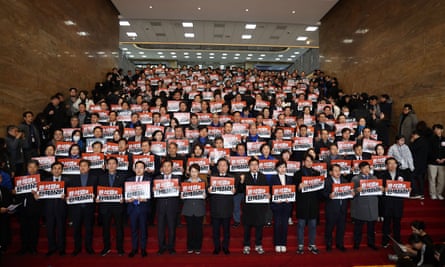The South Korean president, Yoon Suk Yeol, has apologised for his short-lived attempt to impose martial law this week, promising to face any legal or political consequences hours before parliament is due to vote on his impeachment.
In a two-minute televised address to the nation, his first public appearance since he rescinded the martial law order on Wednesday, Yoon said he was “very sorry” for the decision, which he said was born of desperation, and promised not to attempt to impose martial law a second time.
“I am very sorry and would like to sincerely apologise to the people who were shocked,” Yoon said and bowed. “I leave it up to my party to take steps to stabilise the political situation in the future, including the issue of my term in office.”
Lee Jae-myung, the leader of the main opposition Democratic party, dismissed Yoon’s apology as “very disappointing” and said it had only increased public anger and betrayal.
“The president’s very existence is the biggest risk to South Korea right now,” Lee said, maintaining that there was “no other solution” than his immediate resignation or removal through impeachment.

The leader of Yoon’s own People Power party (PPP), Han Dong-hun, also said that the president’s early resignation was unavoidable and that he was no longer in a position to fulfil his duty, according to the national news wire Yonhap.
On Friday, Han had said Yoon was a danger to the country and needed to be removed from power, increasing the pressure on Yoon to quit even though PPP members later reaffirmed a formal opposition to his impeachment.
It was not clear whether the motion submitted by opposition lawmakers would get the two-thirds majority required for Yoon to be impeached. But it appeared more likely after Han on Friday called for suspending his constitutional powers, describing him as unfit to hold the office and capable of taking more extreme action, including renewed attempts to impose martial law.
Impeaching Yoon would require support from 200 of the National Assembly’s 300 members. The opposition parties that jointly brought the impeachment motion have 192 seats combined.
That means they would need at least eight votes from Yoon’s PPP. On Wednesday, 18 of its members joined a vote that unanimously cancelled martial law 190-0, less than three hours after Yoon declared the measure on television, calling the opposition-controlled parliament a “den of criminals” bogging down state affairs. The vote took place as hundreds of heavily armed troops encircled the National Assembly in an attempt to disrupt the vote and possibly to detain key politicians.
The turmoil resulting from Yoon’s bizarre and poorly-thought-out stunt has paralysed South Korean politics and sparked alarm among key diplomatic partners, including neighbouring Japan and Seoul’s top ally, the United States, as one of the strongest democracies in Asia faces a political crisis that could unseat its leader.
Opposition lawmakers claim that Yoon’s martial law declaration amounted to a self-coup and drafted the impeachment motion around rebellion charges.
The Democratic party lawmaker Soyoung Lee sought to reassure the international community on Friday night, saying that her country was open for business.
“If President Yoon is impeached today or tomorrow, there is no need to be alarmed; the international community can continue to invest with confidence in Korea’s strong democracy and resilience,” she said.
The PPP decided to oppose impeachment at a lawmakers’ meeting, despite pleas by Han, who isn’t a lawmaker and has no vote.
But they face a difficult choice ahead of the vote. A recent poll showed 73.6% of South Koreans support impeachment, with majority support even in traditional conservative strongholds.
The Daegu mayor, Hong Joon-pyo, also a PPP member, warned that if Yoon becomes the second president to be impeached following that of former president Park Geun-hye in 2017, “the party will have no reason to exist and will disappear”.
The crisis has also exposed tensions in South Korea’s traditionally rigid political landscape, where voters typically remain loyal to their ideological camp regardless of individual candidates.
Han on Friday said he had received intelligence that during the brief period of martial law, Yoon ordered the country’s defence counterintelligence commander to arrest and detain unspecified key politicians based on accusations of “anti-state activities”.
Hong Jang-won, the first deputy director of South Korea’s National Intelligence Service, later told lawmakers in a closed-door briefing that Yoon called after imposing martial law and ordered him to help the defence counterintelligence unit to detain key politicians.
The targeted politicians included Han, Lee Jae-myung and the National Assembly speaker Woo Won Shik, according to Kim Byung-kee, one of the lawmakers who attended the meeting.
While Yoon’s presidency has been plagued by policy missteps, economic woes and controversial personnel appointments, it has also been overwhelmed by scandals involving his wife Kim Keon Hee, who has proved to be his greatest political liability.
These include allegations of stock price manipulation, unlawful involvement in party candidate nominations, and accepting a 3m won (£1,675) Dior bag as a gift from a pastor.
Yoon has vetoed three separate bills seeking to establish a special counsel to investigate his wife, leading opposition lawmakers to include the alleged attempts to shield his family from investigation among their reasons for impeachment.
Parliament is expected to vote on a fourth attempt to establish a special counsel to investigate Kim right before the impeachment motion. The strategy appears designed to ensure ruling party lawmakers attend both votes, rather than boycotting the crucial impeachment decision through absence.
Large-scale protests took place across the country on Friday night, with more demonstrations planned for Saturday.
Labour unions and civic groups announced a major candlelight march near the national assembly, while Korean communities worldwide are staging their own protests, with demonstrations taking place in London, Paris and Berlin calling for Yoon to step down.
Reuters and Associated Press contributed to this report
Source: theguardian.com

















